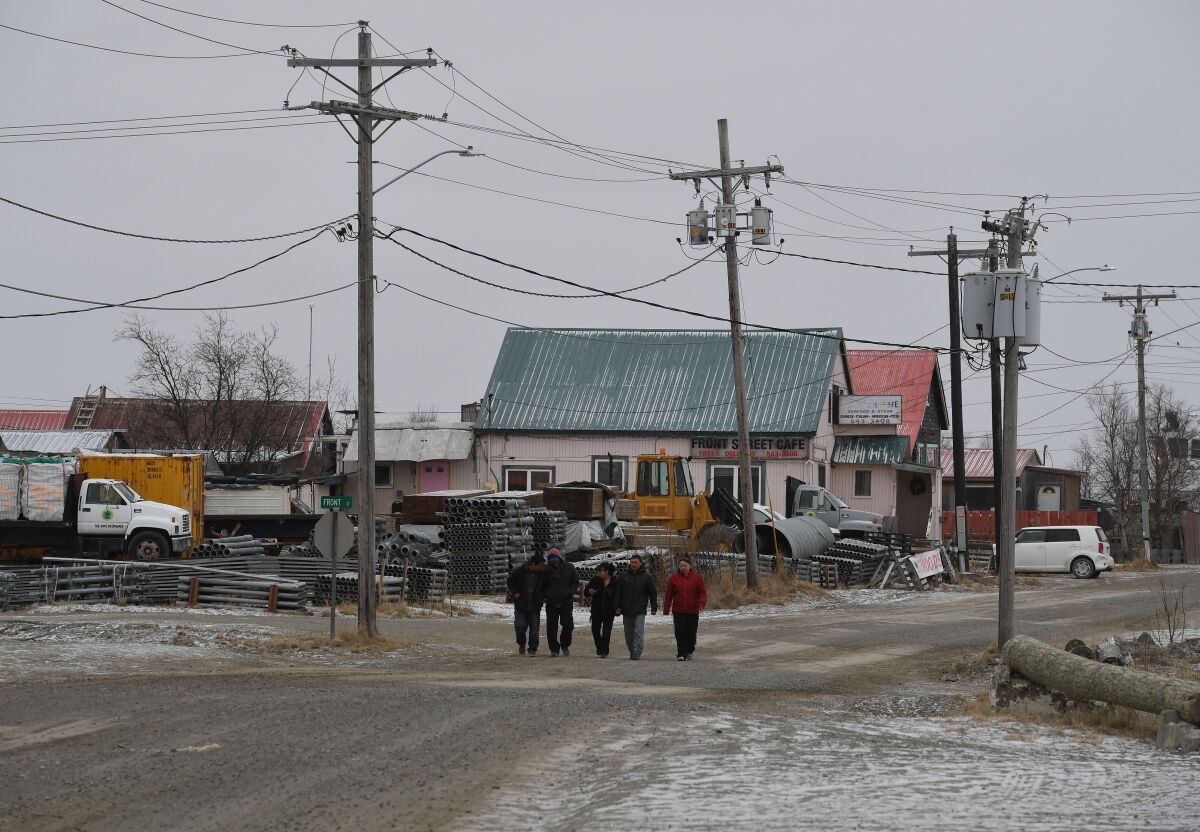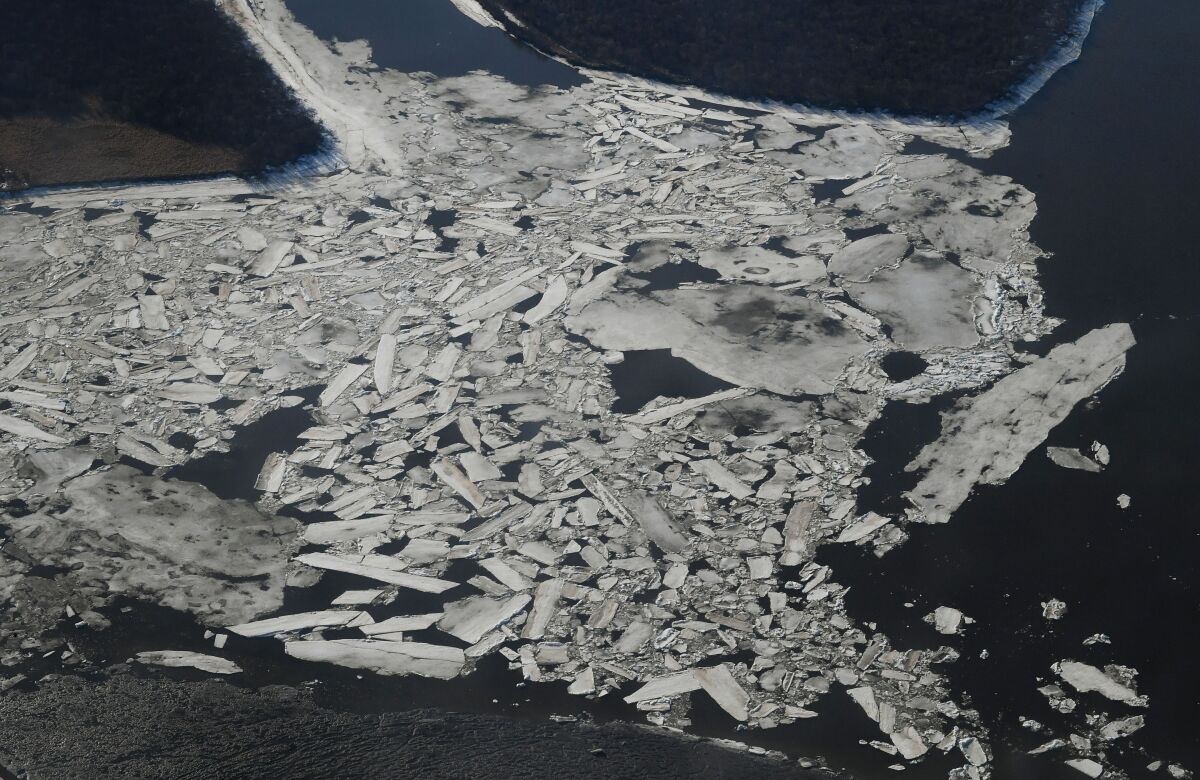Here in southwestern Alaska, the salmon runs are ending for the year; berry picking is over too, and the leaves on the willow trees lining the banks of the Kuskokwim River have started to yellow. In other words, it’s moose hunting season.
“I wanted my grandson to shoot it, but his gun jammed,” said Albert Evans, showing off a set of bloody antlers perched in his skiff after the rest of the moose had been unloaded to the shore.
A wall prevents further erosion into the Kuskokwim River in Rep.-elect Mary Peltola’s hometown of Bethel in southwestern Alaska in 2019.
(Mark Ralston / AFP/Getty Images)
The harbor is the closest thing to a public square in this city of 6,000 reachable only by boat or plane. People waved at one another one recent morning as they backed small fishing boats into the water. An ancient tugboat sat decaying in a grove of willows. A slobbery black dog ran back and forth across the dirt lot.
Evans will take only about a quarter of this moose for himself. He went out as a proxy hunter, to bring meat back for seniors who can’t hunt anymore.
“I have elders in my family, so I’ll give it to them,” Evans said perfunctorily, as if this kind of generosity is commonplace.

Bethel, a city of 6,000 surrounded by rural villages, can be reached only by plane or boat.
(Mark Ralston / AFP/Getty Images)
In fact, it is in Bethel, the hometown of Alaska’s newest political star, Mary Peltola.
Much of the news coverage of last week’s special election to fill the state’s lone seat in Congress focused on the defeat of Sarah Palin as a sign that the Republicans are losing momentum as midterms loom.
But the victory of Peltola, a 49-year-old Democrat, was remarkable in its own right. When she is sworn in next week, she will be the first Alaska Native to serve in Congress.
The land and culture that sustained her as a child now face a series of existential threats that are redefining the political landscape of the state — perhaps forever.
Bethel sits in a corner of the Yukon-Kuskokwim Delta, a vast wetland pockmarked with thousands of lakes formed when permafrost thaws — a terrain know as thermokarst. In a region the size of Oregon, the population is just 26,000 — the majority of them Yup’ik, Cup’ik or Athabascan. Many live a subsistence lifestyle, meaning they hunt, fish and gather as a main source of food.
“It’s so different that I often learned when I was going to school in the Lower 48 not to even mention it,” Peltola said by phone from Anchorage. “It sounds so far-fetched; it sounds almost made-up.”
A culture under siege
Native people make up at least 16% of the population in Alaska — a greater share than in any other state. Peltola’s election was celebrated by Indigenous communities across the country.
But as much as her victory marks a turning point, it also comes at a time where subsistence culture in the delta is under siege.
“There’s threats to our climate, our rivers and our land,” said Beverly Hoffman, a community organizer and former City Council member who was born and raised here. “Mary understands all that.”

The majority of people in the region around Bethel are Yup’ik, Cup’ik or Athabascan. Hunting and fishing is a main source of food for many.
(Mark Ralston / AFP/Getty Images)
The permafrost is thawing as the climate warms, leading to erosion and flooding. Some communities have had to retreat from the riverbank. Others have relocated entirely. Tundra fires are increasingly severe.
The most immediate threat to Bethel’s subsistence culture comes in the form of dramatically diminished salmon runs.

Ice breaks up and melts on the Kuskokwim River near Bethel in the spring of 2019. Scientists have warned that Alaska is warming far faster than the global average.
(Mark Ralston / AFP/Getty Images)
Once home to some of the healthiest stocks in the world, the Yukon and Kuskokwim rivers have been closed to subsistence fishing in recent months as salmon returns dipped below state-mandated levels.
In this region, everything revolves around salmon.
“We only exist here because of the salmon and the ability to live off the land,” Hoffman said. “It was always about the river and what it could provide, since the beginning of time. I don’t feel like we could exist here without that.”
Beyond its cultural significance, subsistence fishing and hunting is how people feed their families. The high cost of shipping goods to the far reaches of Alaska makes them extremely expensive. A box of Wheat Thins costs $7.29, and a gallon of milk sells for $8. A quarter of the people in the Bethel Census Area live in poverty.
Fisheries closures mean that people who normally spend their summer catching, drying and smoking salmon are instead left with nothing.
In campaign appearances, Peltola frequently emphasized how dire the salmon crisis is in western Alaska. She calls herself “pro-fish,” a concept that she says draws involuntary laughter from people in the Lower 48.
“It is a matter of cultural continuity, family cohesion, and teaching values,” she said.
Peltola grew up in Bethel and surrounding villages and spent summers fishing on the Kuskokwim. She knows the impact of the low salmon runs because she’s lived it.
Even after leaving Bethel to serve in the state Legislature in Juneau and then as a lobbyist, she still wraps up unfinished food and puts it in her purse, her mom’s voice echoing in her head: “You’ll think about that later when you’re hungry.”
Until recently, she was the executive director of the Kuskokwim River Inter-Tribal Fish Commission, which helps manage the river, and split her time between Anchorage and Bethel, where she still owns a house.
She and her husband have seven children between them, most of them grown now. She made sure they got to know the place that she is from.
“One of the reasons it was important for me to bring my kids home when they were young and have them grow up on the Kuskokwim is so that my children and I are from the same culture,” Peltola said. “I realized I couldn’t teach my children how to be Yup’ik just through words or books; it can only be taught through the act of hunting, the act of fishing, and the act of sharing.”
Peltola is careful to say that she will represent all Alaskans. But her victory provides a champion for a region and culture that has largely been left out of national politics.
“She’s the one bright spot we have right now,” Hoffman said.
‘Laying down the pathway’
Two days after the election, a long line of people streamed into the Veterans of Foreign Wars building in Bethel for the last bingo night of the week. The long folding tables were filled with families drinking soda and organizing their rainbow-colored bingo sheets.
Mary Peltola is headed to Congress, but it’s still $1 for the “Small Crazy T’s” sheet, $4 for “Double Hollywood,” $23 for a packet.
It is also a difficult time to celebrate. Just last week, three moose hunters went missing after they took a boat upriver to prepare for the start of hunting season. They still have not been found.
Earlier in the summer, a fire that broke out in an apartment complex killed a woman and her two granddaughters. The city has seen a rash of break-ins and car thefts in recent weeks.
There are also long-term questions about what Peltola might be able to achieve in Congress. She is just one representative of over 430.
And because she won a special election, Peltola is only guaranteed four months in office. Another battle with Palin looms in November. There’s a real chance that Peltola’s time in Congress could turn into a footnote.

Democrat Mary Peltola smiles at supporters after delivering remarks at a fundraiser Aug. 12, in Juneau, Alaska.
(Becky Bohrer / Associated Press)
“I do worry that it is a lot to bear,” said Ana Hoffman, who went to junior high with Peltola and is now president and chief executive of Bethel Native Corp., part of a system set up by the federal government in 1971 in a legal land claims settlement with the state’s Indigenous groups. “There’s an enormous amount of expectations on her.”
Hoffman said Peltola has always been self-reliant. But she’s also not alone, and her election is already lifting up the community.
Sophie Swope, director of a local grassroots organization and a candidate for Bethel City Council, said Peltola’s election has filled people with hope.
“She’s laying down the pathway,” said Swope. “She is an Indigenous woman from Alaska going to Congress.”
There’s momentum elsewhere too. School districts in the area have begun making changes that emphasize Alaska Native culture in their teaching. Grassroots organizations have led a growing resistance to development projects such as a planned open-pit gold mine upriver, which activists see as a threat to subsistence culture. Tribal organizations are fighting for greater management of the Kuskokwim River fishery.

Bethel welcomes visitors to “Home of the Kuskokwim 300,” the city’s annual 300-mile dogsled race.
(Mark Ralston / AFP/Getty Images)
The issues that matter here most are the issues that defined Peltola’s campaign — and the ones she plans to champion in Washington.
“I’m very holistic, and that is a very Alaska Native perspective,” she said. “We’re all inextricably linked, and that is a very important perspective to bring to a federal level.”
But for now, it’s moose hunting season. Peltola arrived home on Wednesday to celebrate with friends and family. Maybe she’ll head out on the Kuskokwim. Maybe she’ll even bring a moose back.
McCarthy is a special correspondent.




















Discussion about this post